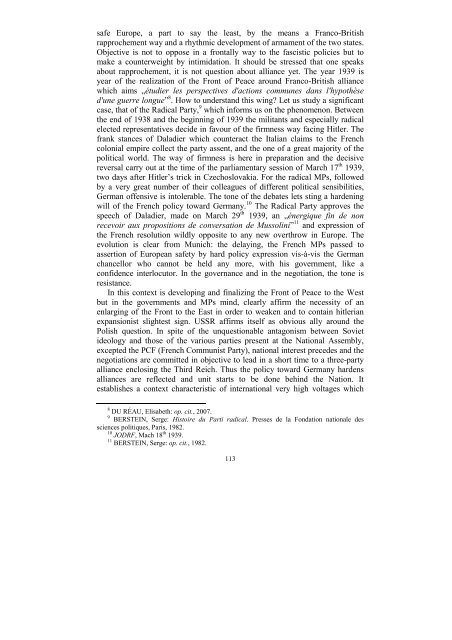The Molotov-Ribbentrop Pact - ELTE BTK Történelem Szakos Portál
The Molotov-Ribbentrop Pact - ELTE BTK Történelem Szakos Portál
The Molotov-Ribbentrop Pact - ELTE BTK Történelem Szakos Portál
You also want an ePaper? Increase the reach of your titles
YUMPU automatically turns print PDFs into web optimized ePapers that Google loves.
safe Europe, a part to say the least, by the means a Franco-British<br />
rapprochement way and a rhythmic development of armament of the two states.<br />
Objective is not to oppose in a frontally way to the fascistic policies but to<br />
make a counterweight by intimidation. It should be stressed that one speaks<br />
about rapprochement, it is not question about alliance yet. <strong>The</strong> year 1939 is<br />
year of the realization of the Front of Peace around Franco-British alliance<br />
which aims „étudier les perspectives d'actions communes dans l'hypothèse<br />
d'une guerre longue” 8 . How to understand this wing? Let us study a significant<br />
case, that of the Radical Party, 9 which informs us on the phenomenon. Between<br />
the end of 1938 and the beginning of 1939 the militants and especially radical<br />
elected representatives decide in favour of the firmness way facing Hitler. <strong>The</strong><br />
frank stances of Daladier which counteract the Italian claims to the French<br />
colonial empire collect the party assent, and the one of a great majority of the<br />
political world. <strong>The</strong> way of firmness is here in preparation and the decisive<br />
reversal carry out at the time of the parliamentary session of March 17 th 1939,<br />
two days after Hitler’s trick in Czechoslovakia. For the radical MPs, followed<br />
by a very great number of their colleagues of different political sensibilities,<br />
German offensive is intolerable. <strong>The</strong> tone of the debates lets sting a hardening<br />
will of the French policy toward Germany. 10 <strong>The</strong> Radical Party approves the<br />
speech of Daladier, made on March 29 th 1939, an „énergique fin de non<br />
recevoir aux propositions de conversation de Mussolini” 11 and expression of<br />
the French resolution wildly opposite to any new overthrow in Europe. <strong>The</strong><br />
evolution is clear from Munich: the delaying, the French MPs passed to<br />
assertion of European safety by hard policy expression vis-à-vis the German<br />
chancellor who cannot be held any more, with his government, like a<br />
confidence interlocutor. In the governance and in the negotiation, the tone is<br />
resistance.<br />
In this context is developing and finalizing the Front of Peace to the West<br />
but in the governments and MPs mind, clearly affirm the necessity of an<br />
enlarging of the Front to the East in order to weaken and to contain hitlerian<br />
expansionist slightest sign. USSR affirms itself as obvious ally around the<br />
Polish question. In spite of the unquestionable antagonism between Soviet<br />
ideology and those of the various parties present at the National Assembly,<br />
excepted the PCF (French Communist Party), national interest precedes and the<br />
negotiations are committed in objective to lead in a short time to a three-party<br />
alliance enclosing the Third Reich. Thus the policy toward Germany hardens<br />
alliances are reflected and unit starts to be done behind the Nation. It<br />
establishes a context characteristic of international very high voltages which<br />
8 DU RÉAU, Elisabeth: op. cit., 2007.<br />
9 BERSTEIN, Serge: Histoire du Parti radical. Presses de la Fondation nationale des<br />
sciences politiques, Paris, 1982.<br />
10 JODRF, Mach 18 th 1939.<br />
11 BERSTEIN, Serge: op. cit., 1982.<br />
113













